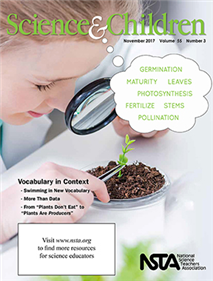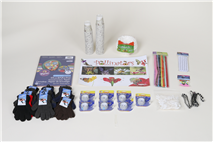All Disciplinary Core Ideas resources
Blog Post
Why Don’t Antibiotics Work Like They Used To?
Why don’t antibiotics work like they used to? is an NGSS-aligned storyline developed by the Next Generation Science Storylines Project that focuses on natural selection and other mechanisms of evolution. Wayne Wright and I (Holly Hereau) teac...
By Holly Hereau and Wayne Wright
Blog Post
How Teachers Are Retooling Lessons Using the EQuIP Rubric
Sometimes finding the right book or article can be the key to opening our minds to new ideas. A few years back, NSTA published a special journal series on the NGSS, and I recently re-read a few of them. Three in particular highlighted teachers’ exp...
By
Journal Article
Formative Assessment Probes: Vocabulary in Context: What Is an Amphibian?
This column focuses on promoting learning through assessment. This month’s issue explores what characteristics make an amphibian....
Blog Post
The Engineering Design Process: A Middle School Approach
To support the Next Generation Science Standards (NGSS) Middle School Engineering Design, we have three goals for our students: to define problems accurately, design the best solution using a rigorous process, and evaluate and improve their designs b...
By Cindy Workosky
Blog Post
Gravitational Interactions and 3-D Learning in Middle School
I recently embarked on a journey with K–8 teachers in Vermont to learn how to be intentional about planning for three-dimensional (3-D) learning in the classroom....
By Cindy Workosky
Blog Post
How NGSS and CCSS for ELA/Literacy Address Argument
In the summer of 2015, I observed an elementary science teacher from an NGSS-adopted state who made a presentation to her cohort of close to 100 K–12 science teacher leaders and administrators from schools, districts, and the state. After presentin...
By Cindy Workosky
Blog Post
Using Claim, Evidence, and Reasoning (CER) Strategy to Improve Student Learning
This past school year, I used claim, evidence, reasoning (CER) statements to show three-dimensional learning in my classroom. Several tools are available for doing this, but the one my students like is the CER Graphic Organizer and Transition Words L...
By Cindy Workosky
Blog Post
You Teach What? I’m So Sorry! Building a Better Body and Building Better Argumentation
I am always amazed at the looks on people’s faces when I tell them I teach middle school. They seem to pity me for having a position I chose and love! They inform me that middle school “tween-agers” are argumentative, stubborn, and at times, ad...
By Cindy Workosky
Blog Post
Why Anchoring Phenomena Are Important in the NGSS Classroom
Who is Ivor Robson, and why is he associated with anchoring phenomena? If you are a longtime golf aficionado, you know that Ivor Robson had a special role at the British Open. Robson spent 41 years introducing each player on the first tee, and he nev...
By Cindy Workosky
Blog Post
When I began aligning my instruction to the Next Generation Science Standards (NGSS), I got lost in the details. But when I realized that phenomena could be used to anchor linked disciplinary core ideas, I started to visualize the course as a whole a...
By Cindy Workosky
Blog Post
At the core of a Next Generation Science Standards (NGSS) classroom is the sequence of exposing students to an interesting natural phenomenon, having students generate questions about the phenomenon, investigating student questions, then creating a s...
By Cindy Workosky
Blog Post
Introducing Crosscutting Concepts in the Elementary Grades
Four years ago, I moved from teaching middle school science to teaching grades 2–5 STEAM (science, technology, engineering, art, and mathematics) labs. One of the biggest challenges I faced was limited lab time in our elementary school. Because we ...
By Cindy Workosky
Blog Post
How I Came to Understand the Three Dimensions
When I first started teaching science, I taught the facts. I taught the nine planets (before Pluto got demoted; sorry, Pluto!), the steps of mitosis, and the workings of plate tectonics, for example. I was proud that I had students who could learn th...
By Cindy Workosky
Class Pack
Flight of the Pollinators PPSTEMK-2 Classpack
*LAST CHANCE! This product is not eligible for return or exchange. All sales are final.* Using Picture-Perfect STEM Lessons: K-2: Using Children’s Books to Inspires STEM Learning in your classroom is easier than ever! NSTA’s ClassPacks, eac...





